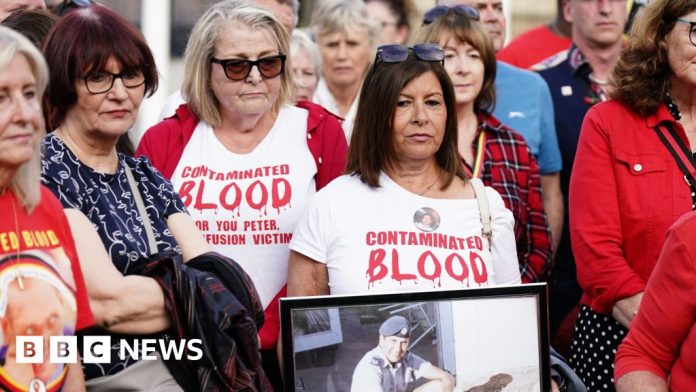The government has said it is making “substantial changes” to the compensation scheme for thousands of victims of the infected blood scandal.
The announcement was made in Parliament two weeks after a heavily critical report into the payment scheme by the chair of the public inquiry into the disaster.
Cabinet Office minister Nick Thomas-Symonds said he wanted to restore trust to people who had been “let down too many times”.
Victims’ groups “cautiously welcomed” the announcement but said it was disappointing that some changes were still subject to further consultation.
It is thought 30,000 people were infected with HIV, hepatitis B or hepatitis C in the 1970s, 80s and early 90s after being given contaminated blood products on the NHS.
The inquiry’s main report into the scandal, published last year, found that too little was done to stop the importing of contaminated blood products from abroad at the time, and that elements of the scandal had been covered up by the health authorities.
Earlier this month the inquiry’s chair, Sir Brian Langstaff, published a 200-page follow-up report after receiving “email after email” expressing concerns about the way the government’s £11.8bn compensation scheme for victims had been managed.
That described the speed that payments had been made as “profoundly unsatisfactory” and said that victims had been “harmed further” by the way they had been treated over the last 12 months.
Responding in parliament, the government said it would immediately accept seven of the 16 recommendations made by the inquiry related to the design of the scheme, with the others subject to consultation with victims.
The Infected Blood Compensation Authority (IBCA), an arms-length body set up by ministers to administer payments, said it would separately accept all 11 recommendations under its remit.
The changes being made include:
- A new system will be created allowing people to register for compensation rather than wait to be invited
- Support payments for widows of those who died in the scandal will be reinstated until their compensation claim is finalised
- People infected with HIV before a 1982 cut-off date will now be able to claim compensation whereas before they were ineligible
- The size of a supplementary payment for victims who were subject to unethical medical research will be reviewed along with the type of patient who qualifies
Thomas-Symonds said: “Our focus as we move forward must be working together to not only deliver justice to all those impacted, but also to restore trust in the state to people who have been let down too many times.”
The compensation scheme is open to those who were infected and also their family members, including parents, children and siblings, who can claim compensation in their own right as someone affected by the scandal.
Under the old rules, family members who died before their own claim was settled would not have received any compensation whatsoever.
That has now been changed so if they die before 31 December 2031 their payment can be passed on through their estate.
The government will also consult on a number of other issues including how the scheme recognises the impact of interferon treatment for hepatitis C which has been linked to severe side effects, and how severe psychological harm is recognised.
Thomas-Symonds said that the changes would cost £1bn on top of the £11.8bn already set aside to pay compensation over the course of this Parliament. An update on the total cost will be made in the next autumn budget.
Andy Evans, the chairman of Tainted Blood, a group which represents 1,600 victims and their families, welcomed the announcement but said that some issues, including the level of compensation for hepatitis victims, had still not been properly addressed.
“The government is clearly listening to us. It’s a shame that it took the further involvement of the inquiry for it to take our concerns seriously, but I hope that this statement marks the start of a better working relationship,” he said.
“We must now press forward to ensure that this compensation scheme provides real justice, as far as money ever can, for all victims of this scandal.”

